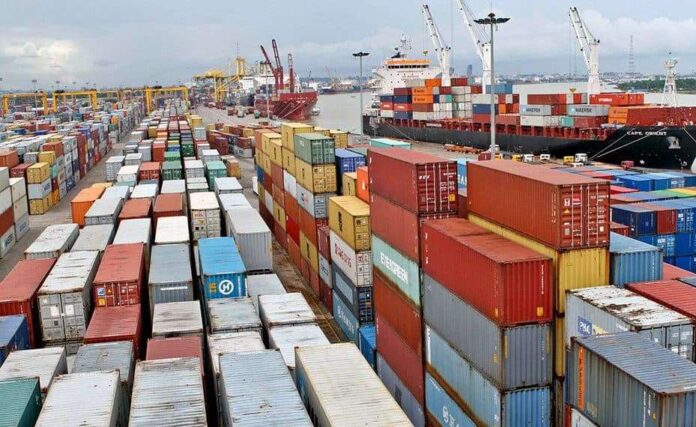By Uzor Odigbo
As congestion hits the Nigerian ports, foreign shipping companies calling at the Lagos seaports pay a whopping $100,000 (N46.5million at prevailing rate of N465/$) each at anchorage before they can berth their vessels for discharging of their cargoes, investigation has shown.
This was as a result of the long turn around time for vessels which are said to be stranded at anchorage for a minimum of 50 days.
The congestion, investigation revealed, was due to inability of clearing agents to evacuate cargoes out of the Lagos seaports – Apapa and Tin-Can Island ports because of Covid-19 pandemic and the shutdown of land borders that increased cargoes to the Lagos seaports.
So, Lagos bound vessels spend at least 50 days at anchorage before they could berth at Apapa port or 25 days before they could berth at Tin-Can Island port.
However, each vessel pay $2000 (N930,000) each day to stay at private Anchorage due to the insecurity on the nation’s waters.
Confirming the longer stay of vessels at anchorage, the executive secretary of the Nigerian Shippers Council (NSC), Barr. Hassan Bello said abandonment of containers at the port by importers was responsible for longer stay of vessels at anchorage.
According to him, importers have turned Nigerian ports that was supposed to be a transit point to warehouse thereby making it impossible for vessels to find space to discharge cargoes.
Bello who spoke through the Council’s Director, Regulators Service of the council, Mrs. Ijeoma Ezedinma, said, “Vessels are now made to wait for about 50 days at Lagos Anchorage before they are called into berth at the designated Terminal.
“We are not supposed to have containers stacked inside the ports. The ports have been converted into warehouses because most owners of these consignments are not coming forward.
“During the lockdown, a lot of warehouses were locked. These accounts for why importers are reluctant to come forward,” he added.
Corroborating the Shippers Counci’s boss, the Vice President of the Association of Nigeria Licensed Customs Agents (ANLCA) Mr. Kayode Farinto lamented the high cost of security charges paid by shipping companies at anchorage.
He informed that shipping companies pay as much as $2000 per day at anchorage for security, stating that it takes close to 50 days at anchorage for a vessel to anchor before it berth at APMT terminal, while it takes 25 days for a vessel heading to TICT.
“Also when a vessel calls in our water, let’s say APMT, it takes 55 days to call, If it is TICT, 25 days. Once a vessel enters our water, it is the job of the NPA to escort you but there is a place they anchor vessel called Secure Anchorage and they pay $2000 a day for a secured anchorage. The question is, who takes that money?” Farinto queried.
He went on to say that the issue of OMSL, the senate investigated and directed that the suspension of Secure Anchorage is still in place and they are still collecting charges for a responsibility that should be carried out by NIMASA and the Nigerian Navy.
“Why The Nigeria Navy aren’t responsive its because of NIMASA’s charges. They felt left out by NIMASA, who keep receiving the fat pay.”
He urged that stakeholders to hold meeting on how to resolve these differences between OMSL and NPA so as to ensure the security on our water and stop the payment of secured anchorage.
His words: “I am one of the people that believe that the shipping companies are the major problem in the country. I am shifting grounds in view of what I have seen. The blame doesn’t go to them alone, chunk of it goes to government agencies as well.
“I took my time to do my research and I notice that NIMASA charge lots of money on a vessel, there is what we called gross tonnage of a vessel, which means that the bigger your vessel, the higher the money you pay to NIMASA and they have been collecting this in dollars and with the MD of NPA concerning these charges against Shipping companies.
“For example, NIMASA is charging for Maritime Environmental and Management Protection Levy, NPA is charging Pollution charges and they are the same charges collected from a Shipping line.
“And because Nigeria is a market where every vessel would like to come due to our burgeoning population, so to survive these shipping companies tend to slam charges on whoever has consignment over a vessel.
“You can’t be charging for Environmental Protection Levy and NPA at the same time charging for Pollution charges,” he said.
He added that when a vessel calls on the Nation’s water-way, NIMASA charges three percent Freight on each container, stating that NIMASA collects about $100 for 1 by 20ft container and $200 dollars for 1 by 40ft container.
Farinto argued that the high cost of charges slammed by NIMASA has led to the country being a dumping ground for empty containers.
He however stated that the high charges slammed on shipping companies should not be a justification for their failure to have holding bays.
“When a vessel calls on the nation’s water, NIMASA charges 3% Freight which means that NIMASA collects $100 for 1 by 20ft and $200 for 1 by 40ft on each container on our water-ways.
“Imagine if you have 500 container on a vessel, how much that will be. Now Nigeria is an empty container dump site.
“Why would Shipping Company abandon their containers? A container cost about $10,000 to build abroad. Minimum Freight is $2000.
“So if a container goes five times in a year, it has covered the money used in buying it. Logically, no marketer would abandon his container here.
“Though there are some Shipping Companies without holding bays. For example, assuming Maersk line brings in 5000 TEUs every month, do they have holding bays for 5000 empty containers? The answer is no. The problem has been either Maersk line or APMT. On the other hand, there may not be having much problem.
“If a vessel calls on a water, on each container they charge N136,000 (container charges for Shipping Companies) and when you are unable to return their container, they start slamming charges on you that’s when you start depleting your deposit,” Farinto declared














